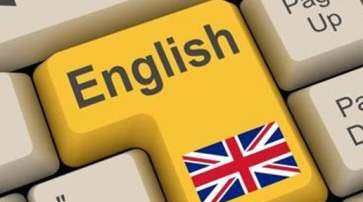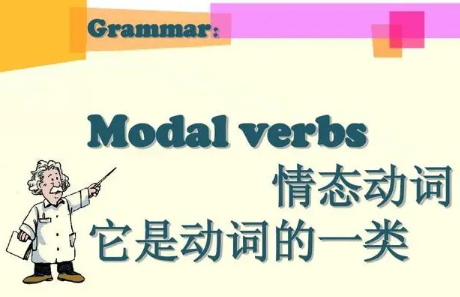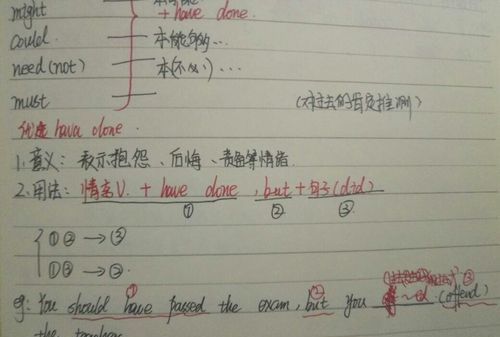本文目录
英语情态动词的基本用法归纳
英语情态动词的基本用法
情态动词的使用一般是英语学习中的重点,以下是我整理的英语情态动词的基本用法,欢迎参考阅读!

一、情态动词的基本用法
1. can基本含义与用法
(1)(表示能力)能……;会……,(2)(表示可能、许可)能够……;可以,(3)(表温和的命令)请做……;得……,(4)(用于疑问句中,表请求、提议)能不能……;要不要…,(5)(用于疑问句中,表惊讶、怀疑等)“(到底)可能有这样的事吗?”,(6)构成特殊句式:
①cannot/ can never...too...或cannot...enough “无论怎么……也不过分;越……越好;非常……”。One cannot be too careful. 越认真越好。I cannot thank you enough.我对你感激不尽。
②cannot help doing.../ cannot help but do.../ cannnot but do...“禁不住;不由得;不得不”。
【注意】情态动词完成式的用法:表示已经发生的情况,can’t/ couldn’t have +过去分词,表示对已发生情况的否定推测,译为“(昨天)一定没……”。 例如: Mary couldn’t have received my letter; otherwise she would have replied before now.
表示虚拟语气,could have+过去分词,表示过去本来可以做但却未做,译为“完全可以……”。例如: What you said is right, but you could have phrased it more tactfully.
2. may基本含义与用法
(1)(表准许、请求)可以、(2)(表愿望、祝福)但愿;祝……。此时,句子要用倒装语序、(3)(用于目的状语从句中)为了;为了能够、(4)(用于让步状语从句中)即使;无论、(5)构成句型:may/ might as well do sth. “还是做某事的好;不妨去做某事”
【注意】情态动词完成式的用法:表示已经发生的情况,may/ might have +过去分词,表示对已发生的事情做不肯定、可能性很小的推测,或事实上根本没发生,译为“也许……”。例如:At Florida Power’s Crystal River plant, a potentially serious leakage of radioactive water may have been unknowingly caused by an electrician.
表示虚拟语气,may/ might have + 过去分词,表示过去可以做但实际未做,译为“(那样)也许会……”。例如: It might have been better to include more punchy statistics and photos of equipment in the introduction to further assist first-time office automation managers.
3. must基本含义与用法
(1)(表义务、必要性、命令)必须,得,要,mustn’t表“禁止、不准”、(2)(表必然性)必定、(3)(表固执、不满等)偏偏;硬要;偏要,例如:If you must know,I’m going to help him look for an apartment.
【注意】情态动词完成式的用法:must have +过去分词,表示对已发生情况的肯定推测,译为“(昨天)一定……”。例如: My pain must have been apparent the moment I walked into the room, for the first man I met asked sympathetically: “Are you feeling all right?”
4. shall基本含义与用法
(1)用于疑问句中,与第一、三人称连用,表示征求对方的意见,may用于征求对方的许可,shall用于征求对方的意见或指示、(2)用于第二、三人称,表示说话人的命令、警告、强制、允诺、威胁或决心等、(3)(用于法律、规则等条文中)应……,须……,得……
5. should基本含义与用法
(1)(表义务、责任)应该、(2)(表预期)应该会,想必会,一定会……吧、(3)(表惊讶、遗憾)竟然;居然、(4)(与疑问词连用,表示意外、纳闷、惊讶等)究竟是;到底、(5)(用于条件状语从句中)一旦;万一、(6)(用于表示命令、建议、请求的动词后面的that从句中,且should可省略)应该;必须,例如:She demanded that they (should) leave at once.(7)(用于以lest,for fear that,in case引导的状语从句中)以免;唯恐,例如:She gave me a list just in case I should forget what to buy.
【注意】情态动词完成式的用法:表示虚拟语气,should/ should not have +过去分词,表示应该做某事但实际上未做,或本不应该做但实际上做了, 译为“本(不)应该……”。如:I regret having left the work unfinished; I should have planned everything ahead carefully.
6. would基本含义与用法
(1)(表过去的习惯性动作)(从前)常常;经常、(2)(表示说话者的厌烦、焦躁)老是;偏要、(3)(用于否定句中,主语一般是事物,表示某事物暂时的特性)就是(不能)、(4)表示请求或个人的想法、看法,使语气婉转,例如:Would you mind if I opened the window?
二、表推测情态动词辨析
1. must,can/ could,may/ might可以用来对事情进行推测。
must表推测时只能用于肯定句,是对现在或过去的'事情进行的推测,不能表对将来事情的推测,语气非常肯定,译为“一定……”。
can/ could表推测时一般用于否定句或疑问句,也是对现在或过去的事情进行推测,但could偶尔可用于肯定推测。
may/ might表推测时一般用于肯定句或否定句,可对现在、过去或将来的事情进行推测,语气不很肯定,译为“可能……”。
2. “情态动词+have done”结构用于对过去事情的推测。
might have done和could have done除了表对过去事情的推测外,还可表示一种责备语气,意为“(过去)本来可以(能够)做某事,但实际上没有做到”,此时不能用may或can。
例如:He might have given you more help,even though he was very busy.
3. 表责备语气情态动词should,ought to,could,might,need等常用来表示说话人对过去事情的不满或遗憾,带有较强烈的责备语气。
should (ought to) have done “本应该……”,表示过去应该做而(实际)没有做的事情,含有责备或遗憾的语气,其否定形式为“should not/ought not to have done”,should have done还可以表示惊讶、赞叹等情绪。例如:It’s wonderful that you should have achieved so much in these years.
could/ might have done “本来能够(会)……”,表示过去本来可以(能够)做某事,但实际上没有做到。
needn’t have done“本来不需要……”,表示过去本来没有必要做某事,但事实上却做了。
三、几个情态动词常考的句型
1. may/ might (just) as well“不妨,最好”,与had better相近。
例如: Since the flight was cancelled, you might as well go by train.
2. cannot/ can’t…too… “越……越好,怎么也不过分”。
注意这个句型的变体cannot…over…。例如: You cannot be too careful when you drive a car. The final chapter covers organizational change and development. This subject cannot be overemphasized.
;情态动词的种类.情态动词的一般疑问句和特殊疑问句.情态动词的用法
情态动词用法归纳
情态动词有can (could), may (might), must, have to, shall (should, will (would), dare (dared), need (needed), ought to等. 情态动词无人称和数的变化;不能单独使用,必须与其后的动词原形构成谓语
一、 can, could
1) 表示能力(体力、知识、技能).
Can you lift this heavy box?(体力)
Mary can speak three languages.(知识)
Can you skate?(技能)
此时可用be able to代替.Can只有一般现在时和一般过去式;而be able to则有更多的时态.
I’ll not be able to come this afternoon.
当表示“经过努力才得以做成功某事”时应用be able to,不能用Can.如:
He was able to go to the party yesterday evening in spite of the heavy rain.
2) 表示请求和允许.
-----Can I go now?
----- Yes, you can. / No, you can’t.
此时可与may互换.在疑问句中还可用could,
might代替,不是过去式,只是语气更委婉,不能用于肯定句和答语中.
---- Could I come to see you tomorrow?
---- Yes, you can. ( No, I’m afraid not. )
3) 表示客观可能性(客观原因形成的能力).
They’ve changed the timetable, so we can go by bus instead.
This hall can hold 500 people at least.
4) 表示推测(惊讶、怀疑、不相信的态度),用于疑问句、否定句和感叹句中.
Can this be true?
This can’t be done by him.
How can this be true?
二、 may, might
1) 表示请求和允许.might比 may语气更委婉,而不是过去式.否定回答时可用can’t
或mustn’t,表示“不可以,禁止”.
----Might/ May I smoke in this room?
---- No, you mustn’t.
---- May/Might I take this book out of the room?
---- Yes, you can. (No, you can’t / mustn’t. )
用May I...?征徇对方许可时比较正式和客气,而用Can I...?在口语中更常见.
2)用于祈使句,表示祝愿.
May you succeed!
3) 表示推测、可能性(不用于疑问句).
might不是过去式,它所表示的可能性比may小.
1.He may /might be very busy now.
2.Your mother may /might not know the truth.
三、 must, have to
1) 表示必须、必要.
You must come in time.
在回答引出的问句时,如果是否定的,不能用mustn’t(禁止,不准),而用needn’t, don’t have to(不必).
---- Must we hand in our exercise books today?
---- Yes, you must.
---- No, you don’t have to / you needn’t.
2) must是说话人的主观看法, 而have to则强调客观需要.Must只有一般现在时, have to 有更多的时态形式.
1. he play isn’t interesting, I really must go now.
2. I had to work when I was your age.
3) 表示推测、可能性(只用于肯定的陈述句)
1. You’re Tom’s good friend, so you must know what he likes best.
2. Your mother must be waiting for you now.
四、 dare, need
1) dare作情态动词用时, 常用于疑问句、否定句和条件从句中, 过去式形式为dared.
1. How dare you say I’m unfair?
2. He daren’t speak English before such a crowd, dare he?
3. If we dared not go there that day, we couldn’t get the beautiful flowers.
2) need 作情态动词用时, 常用于疑问句、否定句.在肯定句中一般用must, have to, ought to, should代替.
1.You needn’t come so early.
2. ---- Need I finish the work today?
---- Yes, you must. / No, you needn’t.
3) dare和 need作实义动词用时, 有人称、时态和数的变化.在肯定句中,dare后面常接带to的不定式.在疑问句和否定句中,dare后面可接带to或不带to的不定式.而need后面只能接带to的不定式.
1. I dare to swim across this river.
2. He doesn’t dare (to) answer.
3. He needs to finish his homework today.
五、 shall, should
1) shall 用于第一人称,征求对方的意见.
What shall we do this evening?
2) shall 用于第二、三人称,表示说话人给对方的命令、警告、允诺或威胁.
1. You shall fail if you don’t work hard.(警告)
2. He shall have the book when I finish it.(允诺)
3. He shall be punished.(威胁)
六、 will, would
1) 表示请求、建议等,would更委婉.
Will / Would you pass me the ball, please?
2) 表示意志、愿望和决心.
1. I will never do that again.
2. They asked him if he would go abroad.
3) would表示过去反复发生的动作或某种倾向.would表示过去习惯时比used to正式,且没有“现已无此习惯”的含义.
1. During the vacation, he would visit me every other day.
2. The wound would not heal.
4) 表示估计和猜想.
It would be about ten o’clock when she left home.
七、 should, ought to
1) should, ought to表示“应该”,ought to表示义务或责任,比should语气重.
1. I should help her because she is in trouble.
2. You ought to take care of the baby.
2) 表示劝告、建议和命令.should, ought to可通用,但在疑问句中常用should.
1. You should / ought to go to class right away.
2. Should I open the window?
3) 表示推测
should , ought to (客观推测), must(主观推测).
1.He must be home by now. (断定他已到家)
2.He ought to/should be home by now.(不太肯定)
3. This is where the oil must be.(直爽)
4. This is where the oil ought to/should be.(含蓄)
从高考题看情态动词的用法
最近几年高考试题中常常借助语境来考查情态动词的基本用法及其区别,因此在平时学习时准确理解和掌握情态动词的基本用法十分重要.情态动词的用法复杂多变,在高考试题中,命题者常常利用语境和句子之间意义上的细微差别来考查学生对情态动词的理解和掌握.对于情态动词,除了要求考生能够准确掌握它们的基本用法外,还要充分利用高考试题所设置的语境来分析句子之间所体现的特殊关系.下面就近几年来高考试题中出现的情态动词的考点进行归纳分析,以便同学们复习掌握.
一、用“情态动词+have +done”结构表示对过去动作的推测,高考试题中常用过去时态或过去的时间状语给以暗示.情态动词的这一用法可以用 “对立统一”来概括.
1.当试题的前句和后句在动作和意义上相互补充说明,且整个句意在动作和时间上是一个整体时,我们可用“统一”关系来解决这样的试题.常见的结构有:
must have done: 表示对过去动作的肯定推测,常译作“一定做了……”,只能用于肯定句中.其否定形式为can’t/couldn’t have done? 疑问式为Can/Could...have done?.
could /might have done:表示对过去发生的动作的可能性推测,常译作“可能做了……”.如:
1) Sorry I’m late. I _____ have turned off the alarm clock and gone back to sleep again. ?(北京 2000春)
A. might B. should C. can D. will
该题前句说明了结果,后句接着说出了产生这种结果的可能性,对前句进行补充说明.分析选项可知本题应选A.
2) My sister met him at the Grand Theater yesterday afternoon, so he _____ your lecture. ?(上海 2000)
A. couldn’t have attended
B. needn’t have attended
C. mustn’t have attended
D. shouldn’t have attended
该题前句叙说一个客观事实,后句对前句进行补充说明,分析选项可知C是错误的? 而B、D两项不符合题意.故本题选A.又如:
Jack ____ yet, otherwise he would have telephoned me. (上海’97)
A. mustn’t have arrived
B. shouldn’t have arrived
C. can’t have arrived
D. need not have arrived (C)
2.当试题的前后句在动作和意义上构成转折关系时,常借助“but, however, instead”等词来表示过去的动作与客观事实不符,这时我们就可以用“对立”关系来解决这样的试题.这种结构常见的有:
should have done / ought to have done:表示过去本应该做某事而实际上没有做.
should not have done / ought not to have done:表示过去本不应该做某事但事实上却做了.
need have done:表示过去本来有必要去做某事,但事实上没有做.
need not have done:表示过去本来没有必要做某事,但事实上却做了.如:
3) I was really anxious about you. You _____ home without a word. (NMET2001)
A. mustn’t leave B. shouldn’t have left
C. couldn’t have left D. needn’t leave
分析该题前后句之间的关系和语气可知,事实上是 “本不应该离家出走却走了”,故本题选B.
4) I told Sally how to get here, but perhaps I _____ for her. (NMET’94)
A. had to write it out
B. must have written it out
C. should have written it out
D. ought to write it out
由句中的连词but可知前后句之间是对立关系,分析题意可知本题应选C.
二、考查情态动词基本用法之间的比较和辨析.最近几年高考试题中常借助具体的语境来考查考生对那些最常见的情态动词的基本用法的理解和掌握,因此在做这样的试题时应认真分析语境中所含的实际意义,并结合情态动词的基本含义和用法做出正确的选择.
6) —I hear you’ve got a set of valuable Australian coins. _________ I have look?
—Yes, certainly. (北京2002春)
A. Do B. May C. Shall D. Should
分析语境可知这是在征求对方的许可,may表示“允许、可以”,语气比较委婉? shall常用于第一、三人称作主语的疑问句中,表示征求对方意见和指示,如果此空用shall,则意为“要(我)看一下吗?”,不符合上下文意思.故本题选B.
7) Mr Bush is on time for everything. How ____ it be that he was late for the opening ceremony? (上海2001春)
A. can B. should C. may D. must
must be 表示肯定的猜测,只能用于肯定句中,由题意可知本题应选A.
8) Are you coming to Jeff’s party?
I’m not sure. I ____ go to the concert instead. (NMET2000)
A. must B. would C. should D. might
由题意和下句中的 “I’m not sure” 可知这段对话中存在一种可能性推测,might可以用来表示一种比较委婉的可能性判断,故本题选D.
9) Johnny, you ____ play with the knife, you ____ hurt yourself. (NMET’96)
A. won’t; can’t B. mustn’t; may
C. shouldn’t; must D. can’t; shouldn’t
mustn’t 表示“不可以;禁止”,分析题意可知第二个空表示某种可能性,故本题选B.
10) —Will you stay for lunch?
—Sorry, ______. My brother is coming to see me. (NMET’99)
A. I mustn’t B. I can’t
C. I needn’t D. I won’t
分析题意可知因为“我弟弟要来看我”,所以“不能留下”,因此对别人的邀请或要求应给予礼貌的拒绝.A 项表示“禁止”;C项表示“不必要”;而D项表示“不会”,均不符合题意.故本题选B.)
11)—When can I come for the photos? I need them tomorrow afternoon.
—They _____ be ready by 12?00. (NMET’98)
A. can B. should C. might D. need
该题考查情态动词should的基本含义,分析句意可知本题应选B.
The fire spread through the hotel very quickly but everyone ____ get out.(NMET’97)
A. had to B. would C. could D. was able to
该题考查了could和be able to的区别,二者都可表示过去时间的能力,但如果表示过去成功地做了某事只能使用was / were able to do,故本题选D.
13) —Shall I tell John about it ?
—No, you _____. I’ve told him already. (NMET’94)
A. needn’t B. wouldn’t C. mustn’t D. shouldn’t
情态动词shall在试题中表示征询对方意见或请求指示.答句暗示 “没有必要了”,故本题选A.

情态动词的用法总结思维导图
情态动词的用法总结如下:
1、can / could表示“能力”或“客观可能性”,还可以表示“请求”和“允许”;用在否定句、疑问句或感叹句中,还可表示惊异、怀疑、不相信的态度。在一般疑问句第一人称中,表示“征询对方许可”。
2、may表示“许可”,相当于“可以”;用于句型“May I ...?”时,表示征询对方许可。
3、must意为“必须、应当”,表示“义务、命令、必要”;在回答must引出的问句时,肯定回答用must,否定回答常用needn't或don't have to,表示“没有必要”。

4、need作情态动词时,多用于否定句或疑问句中,表示“需要”或“必要”。
5、shall表示说话人征求对方的意见或向对方提议;还可表示说话人给对方的命令、警告、允诺或威胁。
6、shoul意为“应该”,表示义务、责任,可用于各种人称。
7、will用于疑问句中,表示说话人向对方提出请求或建议;还可用来表示做某事的意志、意愿、决心或打算。
8、would表示过去的习惯性动作,有“总是、常常”的意思;还可用于虚拟语气的主句中。
情态动词表推测的三种句式
1.肯定推测
能用于肯定推测的情态动词:must, may, might, could
语气强弱程度:must表示“一定”,语气最强;may和might表示“有可能,大概”, 相当于perhaps,其中might语气比may稍弱;could语气最弱,表示“或许”,相当于possibly
1对现在或将来事情的推测,结构为:must/may/might/could+动词原形
例You have worked hard all day. You must be tired. 你辛苦干一整天,一定累了。
Jack knows her. He may/might know her address. 杰克认识她。他可能知道她的地址。
That could be harmful. 那或许是有害的。
考—What are you doing this Saturday?
—I’m not sure, but I ______ go to the Rolling Stones concert.(重庆高考)
A. must
B. would
C. should
D. might
选D。句意:——本周六你打算做什么?——说不准,不过或许我会去滚石乐队演唱会。本题考查情态动词的用法。根据答语中“I’m not sure”可知是对将来不太肯定的推测,故选D项。must表示推测时,语气最强,意为“肯定,一定”;would表过去将来或表意愿;should意为“应该”。
2 对现在正在发生的事情的推测,结构为:must/may/might/could be doing sth.
例The lights in his office are on. He must be working there. 他办公室的灯亮着,他一定在办公室工作呢。
3 对过去事情的推测,结构为:must/may/might/could have+动词原形
例The ground is all wet. It must have rained last night. 地面全湿了。昨天晚上一定是下雨了。
2.否定推测
能用于否定推测的情态动词:can, may, might, could
语气强弱程度:can’t表示“不可能”,语气最强;may not和might not表示“可能不会”,语气较弱;could not 语气最弱,表示“或许不会”
1 对现在或将来事情的推测,结构为:can’t/may not/might not/could not+动词原形
例Your answer can’t be right. 你的答案不可能是对的。
2 对现在正在发生的事情的推测,结构为:can’t/may not/might not/could not be doing sth.
例I saw her go downstairs just now. She can’t be studying in her room. 我刚刚看见她下楼了,所以现在她不可能在房间里学习。
3 对过去事情的推测,结构为:can’t/may not/might not/could not have done sth.
例He has gone abroad. He can’t have attended the meeting last Friday. 他已经出国了,不可能出席上周五的会议。
3.疑问推测
能用于疑问推测的情态动词:can, could
1 对现在或将来事情的推测,结构为:can/could+主语+动词原形
例Can he be an engineer? 他会是一个工程师吗?
2 对现在正在发生的事情的推测,结构为:can/could+主语+be doing sth.
例Can she be watching TV at home? 她会在家里面看电视吗?
3 对过去事情的推测,结构为:can/could+主语+have done
例Can they have won the football games last Sunday? 他们会赢了上周五的足球比赛吗?
情态动词用于推测语气的助记顺口溜:
“肯不肯, 妈妈肯,妹不问”。即:can(谐音“肯”)不用于肯定式; must(谐音“妈”)仅用于肯定句; may/might(谐音“妹”)不用于疑问句,仅用于否定句和肯定句。
EXERCISE
1.You haven’t eaten anything since this morning; you ______ be hungry.
A. can
B. may
C. must
D. could
2.—Hi, Tom. Any idea where Jane is?
—She ______ be in the classroom. I saw her on the playground just now.
A. mustn’t
B. can’t
C. may not
D. might not
3.David ______ Beijing now. He has gone abroad.
A. can’t tour
B. couldn’t tour
C. can’t be touring
D. mustn’t be touring
4.My book has disappeared. Who ______ it?
A. must take
B. could take
C. must have taken
D. could have taken
5.He ______ the test again, because he looks upset.
A. must fail
B. must have failed
C. can’t fail
D. can’t have failed
答案
01-05 CBCDB

以上就是关于情态动词句型及答语 ,英语情态动词的基本用法归纳的全部内容,以及情态动词句型及答语 的相关内容,希望能够帮到您。

